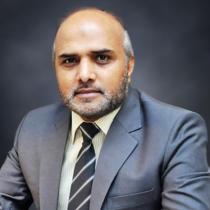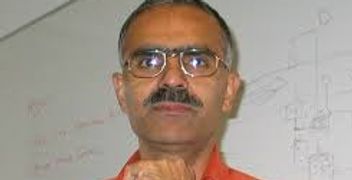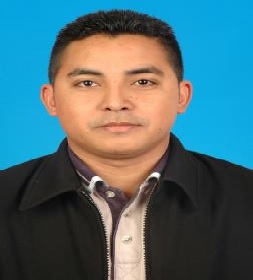speakers
Dr. Jameel Ahmad has 26 years academic and research experience in the area of Electrical/Electronic/Telecommunication Engineering at undergraduate and graduate level in: Teaching, Research, Academic Management. He is Member NCRC, HEC and Approved PhD Supervisor, Pakistan Engineering Council (PEC) Accreditation. Elected Member, Board of Governors of Pakistan Engineering Council (PEC). As a convener/expert PEC, used to visit regularly various universities/institutions for the accreditation of Electrical/Electronic and Telecommunication Engineering disciplines. In this capacity, leading institutions of the Pakistan like LUMS, NUST, NED UET, COMSATS, FAST, Punjab University, UMT, IIU, Bahria University.
Topic: Implementation and working of new Outcome Based Education (OBE) in Pakistan.
Dr. Neyara Radwan
has the privilege to work in two different universities in two
different countries. She works as an Associate Professor in the mechanical
Department, Faculty of Engineering, Suez Canal University, Egypt. Moreover, She is
an Associate Professor and the Quality Assurance Officer for the Ph.D program in
King Abdulaziz, Saudi Arabia. Besides her academic tasks, she worked with many Quality Accreditation bodies
such as; ABET, AMBA, AACSB.
Dr. Neyara has many international projects' contributions and published many
papers in high-quality peer-reviewed journals. Moreover, she is serving as an
editorial board member in many international journals. She also serves as a
reviewer in many international journals.
Dr. Neyara is an international speaker. She participated as a Keynote Speaker in
many international conferences in many countries such as; the US, Canada, India,
Singapore, Pakistan. Dr. Neyara is an active member in many international academic
communities such as: a member of the Global Education Policy Network (GEPN)
which is sponsored by Prince Sultan University (Saudi Arabia) and The State
University of New York at Buffalo (United States). A member of the Organization for
Women in Science for the Developing World (OWSD), based in Italy, 2021. As well as
a member of the World Association of Professional Scientistic (WAPS), Springer. She
is also a Member of the Board of Directors of Accord University, Somalia. Dr. Neyara
is an active member of Asia Logistics and Supply Chain Council (ALSCC), Malaysia.
She also has Honorary Membership in the International Research Committee in
SANGAM UNIVERSITY, INDIA. Dr. Neyara got many national and international
awards. Her research interest is in the field of Sustainability, Digital Transformation,
Renewable Energy, Solid waste management, Recycling, Optimization, and Supply
chain management.
Topic: Research Methodology - Defining and Redefining.


Prof. D. M. Akbar Hussain has been working in the academia and industry for the last 38 years, he has the privilege of working in three different continents that is ASIA, EUROPE and NORTH AMERICA. He has been on editorial boards of over 50 Journals, guest editor and editors for a lot many Journals, he has been examiner for over 50 PhD degree exams, he has been distinguished/invited speaker for many conferences. He has published about 150 papers in Journals and international conferences. Presently he is working as an associate professor in the department of Energy Technology, Aalborg University Denmark. He holds a PhD degree in Control Engineering from the Faculty of Engineering and Applied Sciences (EAPS), University of Sussex ENGLAND, more specifically, in the field of state estimation/Tracking and its implementation on multi-processor systems. The main focus of his research is related with computer and control engineering.
Topic: Assessment Methodolgy at Undergraduate Level Assessment is a hot topic and is very much debated at all levels of education. It has been reported that no clear correlation between high grade/mark and the students’ comprehension level for the topic in question, whereas there was very good correlation between low mark and a low level of comprehension (Jakobsen, A. et al, 1998). Similar findings has also been reported in this reference as well (James N. Spencer (1999). Assessment is a key factor which appears every time whenever a change in curriculum or teaching method is considered, and especially when there is transition from a traditional teaching method to problem based project organized learning in teams. A thorough investigation has been done on developing methods for fair assessment, new demands in engineering today call for other types of competences developed through the studies, competences like social collaborative and communication skills, which require affective learning as well as cognitive learning. This presentation addresses the problem of true and fair assessments with an example of what and how to assess a multidisciplinary project. Assessment is highly debated topic particularly the assessment of PBL based learning and of project organized problem based learning. The discussion further comprises assessment of new competencies like communication skills and social competence which is today a part of the general scope of many university education. For this it is necessary to assess cognitive as well as affective learning. The results of the assessment are used for comparing universities through benchmarking and also for the following reason;
- Student’s learning level within a predetermined area of study.
- Student has acquired the competences demanded by the labor market.
- Student has acquired the qualifications demanded by the authorities (the state)(Document).
- Be a member of the University’s quality development and quality control.
- Team contribute to the student’s motivation and self-recognition.
- Assessment is a judgement based on performance, not personalities.
- Assessment is a judgement based on evidence, not feelings.
- Assessment should be done for clearly identified purpose and with clearly identified performance conditions.
- Assessment is a judgement done in context of published goals, measurable criteria, and pertinent, agreed upon forms of evidence.
- Assessment should be based on multidimensional evidence.

Prof. Dr. Hammad Omer is an Assistant Professor at Department of Electrical & Computer Engineering, COMSATS University Islamabad, Pakistan. He received his PhD from Department of Bioengineering, Imperial College London in 2012 where he had been a Commonwealth scholar between 2008 and 2012. Earlier he did his MS in Bio-medical engineering (Medical Imaging stream) from Imperial College London in 2006, where he was honored with Bargarit Scholar of the year award for his outstanding performance during his MS. He has produced 7 PhDs, supervised more than 20 Graduate Thesis, authored more than 100 research papers (journal papers and conference papers). He has given talks at different conferences held in USA, UK, Canada, France, Austria, Germany and Sweden. Recently, he has filed 4 patents in USA for his inventions in Medical Imaging. He is a full member of International Society of Magnetic Resonance in Medicine (ISMRM), USA. Currently he is leading a research group of more than 35 researchers at COMSATS University Islamabad.
Topic: Magnetic Resonance Imaging (MRI)
Reconfigurable hardware based architectures that could provide good quality image reconstruction for parallel Magnetic Resonance Imaging (MRI) within very less computation time are in high demand. Hardware platforms for specific reconstruction algorithms dramatically increase the power efficiency and decrease the execution time. This research proposes a new parameterized architecture design for Sensitivity Encoding (SENSE) reconstruction. This architecture is also synthesized for Field Programmable Gate Array (FPGA). Complex multiplier, divider and complex matrix multiplier modules are designed to implement the algorithm. Furthermore, the variable data bus widths are used in the data path of the architecture, which leads to reduce the hardware cost and silicon area. Experimental results and comparisons prove the efficiency of the architecture. Moreover, in terms of computation time, the result shows that the proposed technique is 1000 times faster than the conventional MATLAB reconstruction, while maintaining the quality of the reconstructed image. The results indicate that this architectural design can prove to be a significant tool for SENSE reconstruction in MRI scanners.

Dr Wang did PhD from University of South Australia, Australia in 2011. He received two master degrees from National University of Singapore and Dalarna University Sweden in year 2008 and 2006 respectively. Currently, he is research fellow in the department of Electrical Engineering at the University of Adelaide, Australia. His research interests include control design, myoelectric control, soft switching techniques and smart grid technologies. He is co-author of two books and author of more than 100 IEEE publications. He is senior member of IEEE and Associate Editor of IEEE Access. He has won several national and international grants.
Topic: Power Electronics Converters for Smart Grid Fossil fuels are running out and current centralized power generation plants are inefficient with a significant amount of energy lost as heat to the environment, in addition to producing harmful emissions and greenhouse gases. Furthermore, current power systems, especially in developing countries, suffer from several limitations such as high cost of expansion and efficiency improvement limits within existing utility infrastructure. Renewable energy sources can help address these issues, but it can be a challenge to get stable power from these sources, as they are variable in nature. Distributed generators (DG), including renewable sources, within micro grid can help overcome power system limitations, improve efficiency, reduce emissions and manage the variability of renewable sources. Power electronic converters used in microgrid are widely employed as the interface of distributed generators to the utility. These converters can control the renewable source and interfaces with the load effectively, which can be grid-connected or stand-alone mode. In this presentation, the different topologies of power electronic converters are discussed. Finally, their controls and important requirements for grid connection are explained.

Dr. Mohd Rusllim Mohamed was awarded his Ph.D from Universiti Malaysia Pahang (UMP) in 2013. Previously, he completed M.Eng. Electrical Eng. from Universiti Teknologi Tun Hussein Onn (UTHM), Malaysia in 2004, B.Eng. Electronic Eng. from University of Warwick, UK in 2001, and Diploma in Electrical Eng. (Power Systems) from Universiti Teknologi Mara (UiTM), Malaysia in 1998 respectively. He used to be a fellow researcher at University Duisburg-Essen, Germany in 2004 and University of Southampton, UK in 2008-2010. As academician, he is now an Associate Professor at the Universiti Malaysia Pahang (UMP) and an active member of the Sustainable Energy & Power Electronics Research (SuPER) Cluster, which he leads one of the sub-cluster i.e. The Sustainable Energy Group (SEG). Dr. Rusllim involves in technical researches for energy harvesting and energy storage-specifically redox flow battery (RFB). His other research interests include electric vehicles, renewable energy, power electronics and drives systems, soft-computing, control systems and engineering and technical education. At University level, he is appointed as Director of Centre for Academic Innovation & Competitiveness (CAIC) to oversee the foresight, planning and operation of all academic programmes, development of academic staff as well as strategic initiatives for producing quality graduates of UMP. At National level, he has been appointed as a Director for Technology and Technical Secretariat (TTAS) for a newly formed professional body in Malaysia i.e. Malaysia Board of Technologists (MBOT). He involves in several initiatives either as leader or technical committee at Ministry of Education (MOE) Malaysia as well various consultancies and professional task at national level.
Topic: Energy Security: Energy Harvesting and Energy Storage Research Updates Continuous effort in preserving environment and reducing emissions due to massive growth of urban economic development and heightened concerns over crude oil depletions has accelerated researchers to find long term solutions for energy security, both in mobile and stationary applications. As generated electricity from intermittent supply is operated in one way transportation mode, advancement in energy storage technology is urgently needed. This presentation focuses on related issues with respect to energy security from energy generation to storage technologies. Few research updates covering both mobile and stationary applications from the research group for energy harvesting initiatives, energy storage cell designs, and energy management for electric vehicle will be discussed.
Prof. Dr. Muhammad Sadiq Ali Khan is currently an Assc Professor in Computer Science
Department University of Karachi. He is also associated with the Main
Communication Network Department as Incharge MCN. He is also
member of various higher academic boards of different universities. His
research interest includes Network communication, network security,
artificial intelligence, WSN, UWSN, mobile communication system and
cloud computing. Currently as Chair of IEEE Computer Society Karachi
Section.
Topic: Proposed Solution of Security Challenges for the Future Computing System: In Now a days Security challenges increases day by day as Technology rapidly growing fast in order to ease the
user, security becomes the major challenge for the future computing systems. This talk covers the basics of the
security requirements and possible outcomes. This talk reveals the comprehensive detail of the different trusted
computing system and constrained devices security solution that were proposed during the last four decades.
Industry and academia are here with a list of trusted computing architectures to protect by painful behavior to our
digital world, but these solutions have some limitations. This talk focuses on security mechanism, which is suitable
for hybrid technology like the interaction of constrained devices with the cloud. Prof. Dr. Raziq Yaqub an Associate Professor in the EE&CS; Department, Alabama A&M; University, USA, and a Research Professor at NASA Gelnn Research Center, Cleveland, OH. He earned
a Ph.D. in Wireless Communication from Keio University, Japan, and an MBA in Marketing from
Fairleigh Dickenson University, New Jersey, USA. He is an inventor of technologies in Cybersecurity of
Financial Technologies, Wireless Communications, Smart Grid, and Connected Electric Vehicles. He has
45 issued patents, and is a recipient of the “Inventor of the Year Award-2014” from the Inventors Hall of
Fame, New Jersey. He received an award of “Excellence in Scholarship and Research 2019” from the
President of his university, an award of “Innovator Young Faculty,” an award of “Outstanding
Engineering Educator” from the Dean of his college, and “Outstanding Engineer 2020” award from IEEE
region-3.
He remained an Executive Director of Toshiba America Research, New Jersey, to lead 4G/LTE, Department head of NIKSUN
University, Princeton, New Jersey, to lead Cybersecurity, and Director of Global R&D; of Tecvox, Huntsville, AL, USA, to lead wireless
charger and media hubs for the automotive industry. He also remained Sr. Consultant to the State of New Jersey to secure an $87M grant,
a spokesperson of the Department of Homeland Security in 3GPP”, an invited Researcher in NASA Research Center, Cleveland, Ohio,
and an inventor for Wells Fargo, USA.
He also remained Chairman and contributor to standards organizations such as 3GPP, IEEE, WiMAX, MWIF, OMA, Lead Member for
ABET accreditation, Chairman Academic Standards Committee, Chair IEEE Membership Development, Evaluator for technical papers,
Ph.D. theses, patents, and grant proposals, Vice Chairman of IEEE Southeast Conference 2019, organizer of numerous international
conferences, Invited/Keynote speaker, Panel Moderator/Resource Person in international events. He is a Senior Member of IEEE. He
communicates in English, Japanese, Hindi, and Urdu, and has 25 years of experience in the industry, government, and academia.
Topic: The Biggest Ransom Attacks of 2022 — How’s and Why’s of these Attacks: Although not yet common in Pakistan, ransom attacks are becoming popular worldwide as they are one of the
most lucrative and rewarding types of cyberattacks. The biggest Gaming Chipmaker Nvidia is attacked by
Lapsus$ on February 23, 2022, which stole about one terabyte of Nvidia’s “most closely guarded secrets” and
would publish the data should the chipmaker refuse to pay a ransom. A similar attack hit the US Colonial Gas
Pipeline last year, leading to the failure of the control automation system in the Gas Pipeline. This keynote talk
will explain the “How’s and Why’s of this Biggest Ransom Attack.”
The talk is divided into three sections. Section one provides an insight into how security evolved into
Cybersecurity and why it is such a big concern. Section two describes Lapsus$’s Ransom Attack. Section three
explains the how’s and why’s behind the Lapsus$’s ransom attack, and section four provides recommendations
on how to avoid such attacks in the future anywhere, including Pakistan.
The talk will provide food for thought to the students and researchers on how to explore innovative techniques
and conduct Cybersecurity related research. It will also benefit government policymakers, industry leaders,
decision-makers, and corporate researchers. The added benefits of the talk will be transferring the state of the art
knowledge, enhancing interest in research and higher education, establishing a collaborative relationship with
students and faculty, and familiarizing the students with future/global career opportunities.